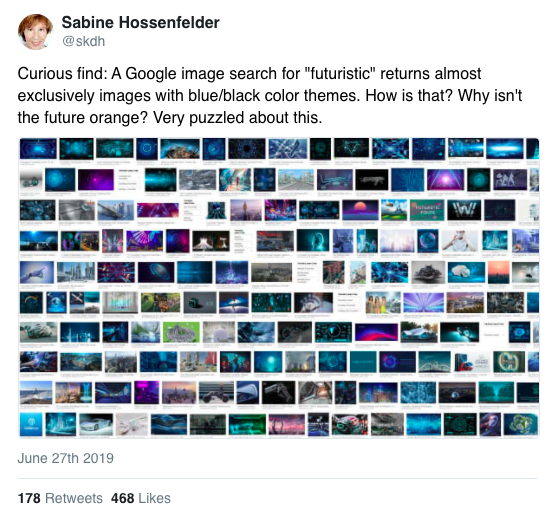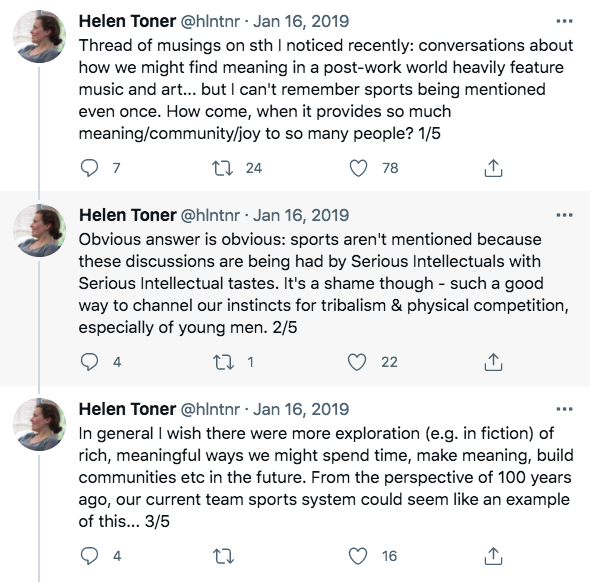
One can imagine a variety of reasons for why “The Future” (as imagined in our collective consciousness) is blue and black, many of which are mundane and fairly obvious.
The screens on our phones, laptops, and TVs are black (the inspiration behind the name of the science fiction series Black Mirror) and it’s probably a good bet that the future will have even more screens (one day we will decide to replace the whole sky with a screen so that it’s never cloudy and every sunset is picturesque). In general, technology calls to mind darker and more metallic colors (silver and grey also seem abundant in our imagined future). The future also calls to mind space exploration which is a very black and blue type of affair - from our grey metallic spaceships we will all look back at our home planet, a pale blue dot hanging in the void.
There may be a less obvious and more interesting reason why we tend to envision the future with a certain aesthetic (darker color palette, sleek, smooth, shiny, etc.).1 Construal-level theory describes how distance of all kinds (temporally, spatially, socially, emotionally, conceptually, etc.) form one general cognitive dimension and how this dimension (near vs. far) affects the abstraction of our thinking. To get a better sense of the theory, I’ll share an abstract from a review paper (slightly more technical) and a few sections from the wikipedia page (slightly less technical).
From Trope and Liberman (2010), “Construal-Level Theory of Psychological Distance”
People are capable of thinking about the future, the past, remote locations, another person's perspective, and counterfactual alternatives. Without denying the uniqueness of each process, it is proposed that they constitute different forms of traversing psychological distance. Psychological distance is egocentric: Its reference point is the self in the here and now, and the different ways in which an object might be removed from that point-in time, in space, in social distance, and in hypotheticality-constitute different distance dimensions. Transcending the self in the here and now entails mental construal, and the farther removed an object is from direct experience, the higher (more abstract) the level of construal of that object. Supporting this analysis, research shows (a) that the various distances are cognitively related to each other, (b) that they similarly influence and are influenced by level of mental construal, and (c) that they similarly affect prediction, preference, and action.
From Wikipedia:
The general idea is that the more distant an object is from the individual, the more abstract it will be thought of, while the closer the object is, the more concretely it will be thought of. In CLT, psychological distance is defined on several dimensions—temporal, spatial, social and hypothetical distance (how likely something is to occur) being considered most important.
An example of construal level effects would be that although planning one's next summer vacation one year in advance (in the distant future) will cause one to focus on broad, decontextualized features of the situation (e.g., anticipating fun and relaxation), the very same vacation planned to occur very soon will cause one to focus on specific features of the present situation (e.g. what restaurants to make reservations for, going for a trip in an off-road vehicle).
Robin Hanson discusses how much of what we imagine about the future is based in the more abstract “far” mode of thinking.
Since the future is far in time, thinking about it tends to invoke a far mode of thought, which introduces other far mode defaults into our image of the future. And thinking about the far future makes us think especially far. Of course many other considerations influence any particular imagined future, but it can help to understand the assumptions your mind is primed to make about the far future, regardless of whether those assumptions are true.
Since blue light scatters more easily than red, far away things in our field of view tend to look more blue. So we expect future stuff to look blue. And since blue stuff looks cold, we expect future stuff to look cold. Finally, since we expect far away things to have less detail, we tend to imagine them with fewer parts and flourishes, and less detailed textures and patterns. The future is not paisley.
We also tend to assume there are fewer relevant categories of far things. So we’ll tend to assume future folk have fewer kinds of food, furniture, cars, houses, roads, buildings, and land uses, whose styles of use vary less from place to place. Instead of seeing a million variations bleeding into each other in dizzying complexity, we tend to assume there are fewer more discrete types, with less variation within each type and larger differences between types. For example, futuristic movies often have everyone wearing very similar clothes.
So the conclusion is that in the future, everyone will look brazilian, there will only be two foods - chocolate nutrient paste or vanilla nutrient paste (both made from Soylent Green), and everyone will wear skin-tight silver jumpsuits.
I’m not the first to make this remark, but imagined futures often seem incredibly boring. Fun doesn’t seem to be a high priority and everything is so serious - it’s all AI apocalypses, intergalactic warfare, and the like. Future people are all scientific geniuses and moral heroes that spend their time traveling the galaxy, pondering the mysteries of the cosmos, and fighting for noble causes. Where is the sex?!?! The drugs?!?!? The music?!?!?! You know, THE FUN!?!?!? (sorry, I got a little excited there…)
Hanson attributes the seriousness and lack of fun in the future to far mode thinking in the the moral, social, and emotional domains.
Sex, money, and temptation tend to be near, while love, satisfaction, trust, and self-control are far. So we often assume future folks have forgotten how to have sex, as in Sleeper or Barbarella, or that money motives are less common, as in Star Trek.
In far mode we tend to focus more on our simple abstract ideals and values, relative to messy desires and practical constraints. We also tend to neglect our messy internal contradictions and conflicts, and therefore assume our values and actions are coherent and consistent. So in far mode we tend more to explain good acts as virtue, and bad acts as vice or evil. We assume future folk are less driven by base desires, more strongly committed to their ideals, less tolerant of domination, more morally enlightened, and more morally judgmental about others’ failings.
Since important things seem nearer to us, stronger emotions feel nearer, and so we have weaker motives and emotions regarding far things. Instead of being filled with elation or terror regarding good or bad things that might happen in the far future, we tend to treat such events more philosophically, and to assume future folk will do so as well.
Tasting and touching tend to feel near, while seeing and hearing tend to feel far. So we mainly imagine what the future looks and sounds like, relative to its taste or touch.
None of this is to say that the future won’t be blue and black, smooth and shiny, boring and serious, or high-minded and philosophical - expectations have a way of becoming self-fulling prophecies. Construal-level theory should give us pause however; perhaps the only thing we see when we look into the future is our own flawed minds.
There is another reason why the future might be nothing like what we imagine - who exactly is the “we” that is doing the imagining? Nerds. Not everyone contributes equally to our collective consciousness, so-called futurists and science-fiction writers - more broadly, nerds - have an outsized role in determining our view of the future. Futurists/science fiction writers/nerds are not a representative sample of the human population by any stretch of the imagination. If the stereotype is true (and we have no reason to believe it’s not), then the people who are most responsible for shaping our view of the future are largely white (at least in the US), male, and are strongly interested in STEM disciplines, particularly computer science and AI. Most of the great science-fiction writers are white males with backgrounds in STEM. The only demographic information I can find on futurists shows strong male bias - the World Future Society and the Association of Professional Futurists are roughly 70% male (Why Aren't There More Women Futurists?).
I’m painting with a very broad brush here, but I think it’s reasonable to say there is a certain personality type that tends to be a futurist/nerd and that this stereotype fits with many of the “stereotypes” about the future. The darker and more masculine color palette and general aesthetic of future seem like something that would be chosen by a group of men without much interest in the art and design. These are also the type of people who we might expect to care the least about fashion (I know I don’t…). This may be more of a stretch, but I would also say that many of the moral and social/emotional aspects of the future (a focus on abstract ideals and virtues, a less emotional and more philosophical outlook, etc.) are also what you would expect from a group of people that tend to excel at science, math, and engineering.
It’s hard to say how much biased representation influences our collective view of the future; maybe most of its features are better explained by construal-level theory or simply the accidents of culture and history. Regardless of how important it is, I think we can use this as a kind of heuristic for thinking about what is missing from our popular conception of the future. What kinds of things does the typical futurist (again, we are stereotyping - white, male, interested in STEM) not appreciate or care about? These are the things that might be more important and more common in the future than we generally anticipate.
I’ll limit myself to one answer, one that I saw in a series of tweets from Helen Toner. Going along with the general lack of fun, you don’t really hear a lot about sports in the future. Everyone is too busy exploring space and fighting robots or aliens, basketball is such a childish waste of time in comparison.


Generally speaking, people who love computer science/AI/STEM tend not to be the most athletic bunch; they also tend not to be diehard sports fans. We can understand why these people might not place a huge emphasis on sports when they think about the future - the fact is that intellectual culture (Serious Intellectuals in Helen’s parlance) generally looks down its nose at sports. However, given the popularity of sports in today’s world, it is a good bet that sports will continue to be important in the near and far future. In fact, I think we might come to develop a whole new perspective on the nature of sport and its role in our existence.
Deaths from despair (suicide, drug overdose, addiction) have become so prevalent as to cause an unprecedented decline in life expectancy in the UK and the US, something not seen since 1918. Mental and physical health (obesity, heart disease, diabetes, etc.) are faltering. Work is more isolating and less satisfying than it has ever been. To put it bluntly, we are lonelier, more depressed, and fatter2 than ever before (and of course COVID-19 has only exacerbated these problems). If only there was an activity that could bring people together, give a sense of achievement and satisfaction, and improve physical and mental health…
It’s remarkable how well athletics, particularly team sports (basketball, soccer, football, etc.), fit as a remedy for many of the social ills of the modern world. I’ll make what I hope to be an uncontroversial statement: sports are massive force for good in society. This is not to say that sports can’t have negative effects; certainly there are people for whom participation in sports, either as an athlete or a fan, is not a net positive in their lives. This is also not to say that sports are a panacea for these death of despair issues; many of them have deep roots in economic and technological trends and any real long-term solution needs to work at these levels. That being said, I think athletics do achieve something more than a superficial treatment of symptoms.
I’ll make another statement which I believe is much more controversial: sports can be a source of ultimate meaning and satisfaction in life. The opposing view - sports (and games of all kinds more generally) are simply meaningless diversions which do not, and cannot, provide absolute value or meaning - is so pervasive that it is rarely discussed explicitly; no one feels the need to argue that sports are not that important in the grand scheme of human civilization. The reasons why this position is so unquestioned are largely the same reasons mentioned above why we think that the future is blue and black and smooth and shiny. On one level, the people who think the and write the most about grand meaning of life questions are typically not people who also have a great interest in athletics (of course there are many exceptions, but that doesn’t change the general picture). However, we shouldn’t discount the role of construal-level theory either - consideration of ultimate philosophical questions lends itself to the far modes of thinking which biases towards more abstract and high-minded ideas and values. The reason we don’t think of athletics as providing ultimate meaning might just represent a cognitive blind spot and nothing more.
(This essay was originally posted at Secretum Secretorum)
Interesting point. I suppose in general the future is simplified because it's just too complex to show it all. Just like the past is often boiled down to some chosen events or people, when in reality lots of stuff was going on everywhere.
It would be fun to read sci-fi, or other speculative fiction, which tells smaller and more intimate stories. Becky Chambers is good at this (and the fleet in the book record of a space born few does have water ball championships). It would be cool to see a sport story set in the future.
When it comes to the positive impact of large sporting events I'm a little uncertain though. In my city there's a huge societal cost to the larger tournaments since so much police is required to guard the public spaces. And many people seem to go to the games simply for the tribal feeling rather than that they enjoy the technical feats of the players. Maybe this tribal feeling is something that can't be escaped and needs an outlet which sport is suitable for. I'm not sure.
I think you are definitely right about the oversimplification of the future, but I guess the point here is that we oversimplify in a somewhat predictable way.
I know one sports story set in the future, available online check it out.
17776 (also known as What Football Will Look Like in the Future) is a serialized speculative fiction multimedia narrative by Jon Bois, published online through SB Nation. Set in the distant future in which all humans have become immortal and infertile, the series follows three sentient space probes that watch humanity play an evolved form of American football in which games can be played for millennia over distances of thousands of miles.
There are definitely aspects of modern sports which are not great, but I am of the opinion that they are basically inescapable and on balance are a good thing. I would argue that any specific short-term costs (like allocation of police) is offset by economic, health, and social benefits, some of which may not be very easy to quantify (e.g. father-son bonding over a favorite team). The modern incarnation of sport is still incredibly young; there is probably considerable room for us to optimize their effect on society. As I point out, the problem is that people who think about the future are biased towards thinking of grand projects with very high-minded goals and not things like sports.